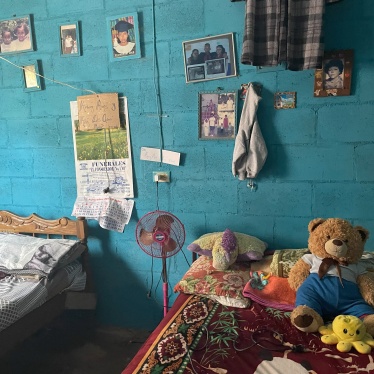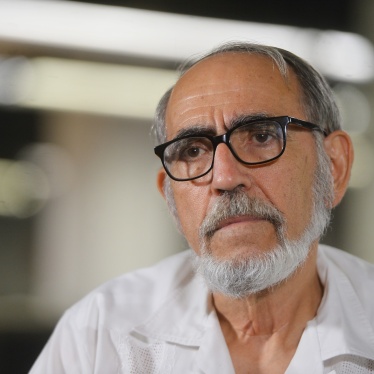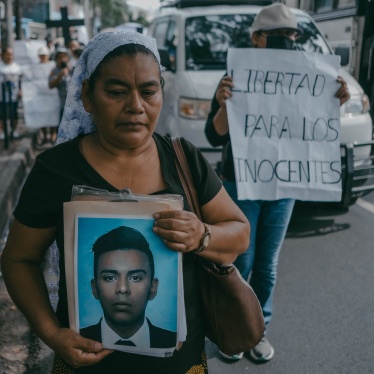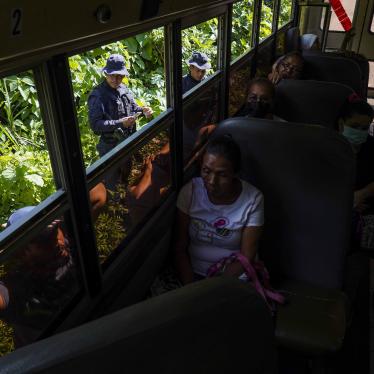Introduction
This submission highlights Human Rights Watch’s key concerns about the human rights situation in El Salvador. Since the previous UPR in November 2019, key aspects of the country’s human rights record have deteriorated, as the government has systematically dismantled democratic institutions, restricted transparency and accountability, and created a hostile environment for journalists and civil society.
While longstanding high levels of gang violence have significantly decreased, the government’s security policies have led to widespread human rights violations, including mass arbitrary detention, enforced disappearances, torture and other forms of ill-treatment in detention, and due process violations.
Chronic human rights challenges persist, including impunity for human rights abuses, and violence against women and lesbian, gay, bisexual, and transgender (LGBT) people.
Public Safety
During its 2019 UPR, the Salvadoran government accepted several recommendations for reducing the country’s pervasive high levels of violence.[1] Since then, the government has declared a “war on gangs,” leading to widespread human rights violations.[2]
In response to a surge in gang killings, El Salvador’s Legislative Assembly declared a state of emergency on March 27, 2022, that remains in place. The state of emergency suspended some fundamental rights, including some due process protections.
In 2022, the Assembly passed a set of criminal law amendments that increased the maximum prison sentence for the crime of “unlawful association” to 10 years for children aged 12 to 15, and to 20 years for those aged 16 to 18.[3] Subsequent legal changes also allowed for mass trials and expanded use of mandatory pretrial detention.[4]
Official figures indicate a significant reduction in levels of violence, with the homicide rate reportedly falling to 2.4 per 100,000 people in 2023.[5]
Recommendations:
- Develop and implement a rights-respecting security policy to dismantle gangs and protect the population from their abuses.
- Address the root causes of criminal violence, such as poverty and lack of economic and educational opportunities.
- Take steps to eliminate the role of the armed forces in public safety tasks.
- End the state of emergency and review legislation including the Special Law Against Terrorist Acts, the Juvenile Criminal Law, and the Law Banning Gangs, Bands, Groups, Associations and Organizations, the Law Against Organized Crime and the Criminal Code and the Code of Criminal Procedure to align it with international human rights law.
Arbitrary Detention, Torture, and Enforced Disappearances
El Salvador has failed to implement accepted 2019 UPR recommendations to prevent and investigate human rights violations by security forces.[6]
During the ongoing state of emergency, Human Rights Watch has documented mass arbitrary detention, torture, and enforced disappearances.[7] To our knowledge, no police or military members have been charged, indicted or convicted in connection with these abuses.
Since March 2022, police and soldiers have arrested over 80,000 people, including some 3,000 children particularly in low-income neighborhoods.[8] As of 2024, the government has not released updated figures on detainee releases; their last report in August 2023 indicated 7,000 releases.[9]
Many detainees have no apparent connections to gang-related violence. Arrests often appear to be based on appearance and anonymous complaints, rather than evidence. Security forces routinely fail to present warrants or provide reasons for arrests. Many detentions appear to have been driven by a policy of “quotas” imposed by commanders of the National Civil Police.[10]
In several cases, officers refused to provide information about detainees’ whereabouts, in what amounts, under international law, to an enforced disappearance.
Cases of torture, including of children, have involved beatings, waterboarding, burnings, suffocations, and mock executions. In many cases, authorities have tried to force detainees to confess their affiliation to gangs or to provide information about other alleged gang members.
In January 2024, El Salvador rejected a request for a visit by the Working Group on Enforced or Involuntary Disappearances, and it has yet to respond to country visit requests from the Working Group on Arbitrary Detention, among others, despite having issued a standing invitation to special procedures.
Recommendations:
- Ensure that prosecutors conduct prompt and impartial investigations into allegations of abuses committed during the state of emergency, including arbitrary detentions, enforced disappearances, torture and other ill-treatment of detainees.
- Raise the statutory minimum age of criminal responsibility to at least 14 years old, as recommended by the Committee on the Rights of the Child.
- Reconsider facilitating a visit by the Working Group on Enforced or Involuntary Disappearances, and facilitate as a matter of priority the visit requested by the Working Group on Arbitrary Detention.
Conditions of Detention and Deaths in Custody
In 2019, El Salvador committed to improve detention conditions.[11]
However, mass imprisonment has raised El Salvador’s prison population to an estimated 108,000 detainees, exceeding the prison capacity by 38,000, and worsening already poor conditions. An alarming 1.7 percent of the country’s population is now detained.
The government built a new prison, Centro de Confinamiento del Terrorismo (CECOT), with a reported capacity of 40,000 detainees. While the facility may help address overcrowding, its size raises concerns about the potential to hinder individualized treatment of detainees and runs counter to the UN Standard Minimum Rules for the Treatment of Prisoners.[12]
Thousands have been held incommunicado for weeks or months or only allowed to see their lawyer for a few minutes before their hearings.[13] At time of writing, detainees continue in incommunicado detention.
At least 261 detainees have died in prison during the state of emergency, Cristosal, a Central American rights group, reported in July 2024.[14]
Human Rights Watch documented in detail a number of the cases of deaths in custody, finding evidence of potential torture, ill-treatment, and failure to provide necessary medical care. Forensic experts who reviewed photographic evidence in two cases found suspicious signs of trauma that may constitute torture or ill-treatment which may have contributed to the custody deaths. In some cases, authorities buried deceased detainees in mass graves without informing families or conducting adequate investigations.[15]
Investigations into such deaths have fallen short of international standards.[16] Medical reports and death certificates often lack crucial information, and, in at least two cases, Human Rights Watch found that autopsies were not conducted. In June 2023, the Attorney General’s Office said that investigations into 142 deaths in detention had been closed.[17]
Recommendations:
- Take immediate steps to reduce prison overcrowding, including by applying alternatives to prison for children and other vulnerable people.
- End incommunicado detention.
- Allow international humanitarian organizations and the Human Rights Ombudsperson’s Office unimpeded access to prisons.
- Conduct prompt and impartial investigations into suspicious deaths in custody.
Due Process Violations
In its 2019 UPR, El Salvador accepted a recommendation to “improve public safety through various measures, including strengthening the investigative capacity of the Attorney General’s Office, to ensure the proper investigation and prosecution of criminal cases.”[18]
However, mass arrests, coupled with pervasive due process violations, undermine detainees’ rights and access to justice for victims of gang violence.
Authorities routinely violate accused persons’ rights, including through their failure to show warrants, inform those arrested of the grounds for arrest, place children in adequate facilities, avoid prolonged pretrial detention, grant legal representation access, and allow family contact. Most detainees are represented by overburdened public defenders. The vast majority of people detained under the state of emergency appear to be in pretrial detention.[19]
In almost all cases documented by Human Rights Watch, prosecutors have charged detainees with the broadly defined crime of unlawful association, enacted in 2016. This offense criminalizes anyone who “takes part” in a gang, is the “creator, organizer, chief, leader [or] financer” of a gang, or “promotes, helps, facilitates or favors the creation or presence” of gangs or, knowing such groups are unlawful, “receives direct or indirect benefit” from relations “of any nature” with gangs, “even without being a part of them.”[20]
As of February 2024, over 1,000 children had been convicted during the state of emergency, primarily for gang membership,[21] with sentences ranging from 2 to 12 years. In many cases, courts had convicted children on the basis of unreliable or uncorroborated evidence, with some judges and prosecutors pressuring children to plead guilty.
Recommendations:
- Review the cases of people detained during the state of emergency, prioritizing the prosecution of those responsible for violent crimes, and release all of those detained without sufficient evidence.
- End mandatory pretrial detention.
- Ensure prosecutions are based on reliable and corroborated evidence.
- Guarantee legal representation for all accused, and provide quality public defense services.
Judicial Independence and Anti-Corruption
In its 2019 UPR, El Salvador accepted recommendations to “reinforce the rule of law […]” and “eliminate impunity, including corruption […].”[22] Instead, the government has severely eroded the rule of law and dismantled an international anti-corruption commission.
In May 2021, the Assembly summarily removed and replaced the attorney general and all five judges in the Constitutional Chamber of the Supreme Court.[23] They appointed a total of 10 out of 15 Supreme Court judges, exceeding the number allowed per legislative session.
The new Constitutional Chamber allowed President Nayib Bukele to run for re-election, contradicting longstanding jurisprudence, and he was elected for a second term in February 2024.[24] In June 2021, the new attorney general ended a cooperation agreement with the International Commission Against Impunity in El Salvador (CICIES).[25]
Legislators passed laws allowing the Supreme Court and the attorney general to transfer all judges and prosecutors to new posts and the dismissal of those over age 60, contradicting international standards on judicial independence.[26]
El Salvador has not responded to a request to visit the country made in 2022 by the UN Special Rapporteur on the independence of judges and lawyers.
Recommendations:
- Restore judicial independence, including by conducting, at the appropriate time, independent, fair, and transparent processes for the selection of Supreme Court justices and the attorney general.
- Bring the Judicial Career Law and the Organic Law of the Attorney General’s Office in line with international human rights standards.
- Facilitate the visit requested by the Special Rapporteur on the independence of judges and lawyers.
Civic Space
Despite 2019 UPR commitments to protect human rights defenders and journalists, the government has created a hostile environment for civil society.[27] Journalists and organizations face digital and physical harassment, surveillance, dubious investigations and audits, and smear campaigns. The government has undermined the credibility of independent media and civil society, baselessly accusing them of supporting gangs.[28]
In November 2021, the government sent to the Assembly a “foreign agents” bill that would restrict the work of civil society and media. The bill has not yet been put to a vote.
Recommendations:
- Refrain from harassing and stigmatizing journalists and civil society members.
- Refrain from adopting laws restricting civil society and media work.
Access to abortion services
El Salvador criminalizes abortion under all circumstances. Women and other pregnant people who undergo abortions can be sentenced to up to 12 years in prison, while people who induce or assist abortions can receive sentences of up to 5 years.[29] El Salvador previously rejected recommendations on the decriminalization of abortion.[30]
Human Rights Watch documented cases of women convicted and, in some cases, sentenced to decades in prison, on charges of abortion, homicide, or aggravated homicide, including after miscarriages or obstetric emergencies. Despite El Salvador’s agreement to “end the unjust imprisonment of women who have had an obstetric emergency” in its 2019 UPR, courts have continued this practice.[31]
In May 2021, legislators shelved a bill to decriminalize abortion when the life or health of the woman is at risk, in cases of rape, or when the fetus has serious complications incompatible with life outside of the womb.
Recommendations:
- Decriminalize abortion in all circumstances and ensure safe, legal access.
- Provide comprehensive post-abortion care, without discrimination or prosecution.
- End the unjust prosecution and imprisonment of women who have had an obstetric emergency.
Violence Against LGBT People, Legal Gender Recognition
In its 2019 UPR, El Salvador agreed to implement anti-discriminatory policies, with the aim of preventing, condemning and prohibiting all types of violence and discrimination against LGBT people, and to investigate cases of violence against them.[32] However, LGBT people remain targets of homophobic and transphobic violence.[33] In many cases, LGBT people are forced to flee the country.
In February 2022, the Supreme Court ordered the Assembly to create a procedure for transgender people to change their names on identity documents within a year.[34] As of July 2024, legislators had not discussed the bill. Meanwhile, transgender people continue to experience discrimination due to a mismatch between their gender and their identity documents.[35]
Recommendations:
- Pass a gender identity law that allows people to change the sex indicators on their official documents through a simple administrative process.
- Enact comprehensive, civil non-discrimination legislation protecting gender identity and sexual orientation.
- Create a specialized office to eradicate LGBT discrimination.
[1] A/HRC/43/5. Recommendations 103.43 (Spain), 103.56 (Japan), 103.73 (Norway), 103.44 (Turkey), 103.54 (Timor-Leste), 103.57 (Republic of Korea), 103.59 (Honduras), 103.86 (Myanmar), 103.87 (Nigeria), 103.89 (Serbia), 103.90 (State of Palestine), 103.91 (Tunisia), 103.92 (Ukraine), 103.93 (United Kingdom of Great Britain and Northern Ireland), 103.95 (Egypt).
[2] Human Rights Watch and Cristosal, “We Can Arrest Anyone We Want:” Widespread Human Rights Violations Under El Salvador’s “State of Emergency” (Human Rights Watch: New York, 2022), https://www.hrw.org/report/2022/12/07/we-can-arrest-anyone-we-want/widespread-human-rights-violations-under-el.
[3] Amendments to the Juvenile Criminal Law, Decree 342, signed into law on March 30, 2022, https://www.asamblea.gob.sv/sites/default/files/documents/decretos/F206BC53-441C-4D71-93FF-FCEF3C15FC89.pdf (accessed May 1, 2024), art. 2.
[4] “Special transitory provisions to regulate the processing of defendants detained under the state of emergency” (“Disposiciones transitorias especiales para ordenar el procesamiento de imputados detenidos en el marco del régimen de excepción”), Decree No. 803, signed into law on August 25, 2023, https://www.asamblea.gob.sv/sites/default/files/documents/decretos/C863822E-F7A1-4719-A529-590B7515C918.pdf (accessed July 1, 2024); “El Salvador: Sweeping New Laws Endanger Rights,” Human Rights Watch news release, April 8, 2022, https://www.hrw.org/news/2022/04/08/el-salvador-sweeping-new-laws-endanger-rights.
[5] “2023 Was the Safest Year in El Salvador’s History” (“El 2023 fue el año más seguro en la historia del El Salvador”), National Civil Police press release, January 3, 2024, https://www.pnc.gob.sv/el-2023-fue-el-ano-mas-seguro-en-la-historia-del-el-salvador (accessed July 1, 2024).
[6] A/HRC/43/5. Recommendations 103.46 (United States of America), 103.61 (Luxembourg), 103.64 (Serbia), 103.67 (Angola), 103.73 (Norway).
[7] Human Rights Watch and Cristosal, “We Can Arrest Anyone We Want:” Widespread Human Rights Violations Under El Salvador’s “State of Emergency.”
[8] Information provided to Human Rights Watch via email by the Public Defender’s Office, April 17, 2024 (on file with Human Rights Watch).
[9] Message posted on X by @Dialogo 21, August 22, 2023, https://x.com/dialogo21/status/1693980751161639369 (accessed July 1, 2024).
[10] Human Rights Watch and Cristosal, “We Can Arrest Anyone We Want:” Widespread Human Rights Violations Under El Salvador’s “State of Emergency.”
[11] A/HRC/43/5. Recommendations 103.47 (Bolivarian Republic of Venezuela), 103.53 (Russian Federation) and 103.55 (Denmark).
[12] United Nations Standard Minimum Rules for the Treatment of Prisoners (The Nelson Mandela Rules), UN Doc. A/RES/70/175, January 8, 2016, https://www.unodc.org/documents/justice-and-prison-reform/Nelson_Mandela_Rules-E-ebook.pdf (accessed July 1, 2024), rule 89 (3).
[13] Human Rights Watch and Cristosal, “We Can Arrest Anyone We Want:” Widespread Human Rights Violations Under El Salvador’s “State of Emergency.”
[14] Cristosal, Silence Is Not an Option: Investigation into the practices of torture, death, and failed justice under the state of emergency (“El silencio no es opción: Investigación sobre las practices de tortura, muerte y justicia fallida en el régimen de excepción”) (Cristosal: San Salvador, 2024), https://cristosal.org/ES/el-silencio-no-es-opcion-informe-completo/ (accessed July 10, 2024).
[15] Human Rights Watch and Cristosal, “We Can Arrest Anyone We Want:” Widespread Human Rights Violations Under El Salvador’s “State of Emergency.”
[16] Ibid.
[17] Message posted on X by @_elfaro_, June 13, 2023, https://x.com/_elfaro_/status/1668685078149341204 (accessed July 1, 2024).
[18] A/HRC/43/5. Recommendation 103.56 (Japan).
[19] “El Salvador: Leaked Database Points to Large-Scale Abuses,” Human Rights Watch news release, January 27, 2023, https://www.hrw.org/news/2023/01/27/el-salvador-leaked-database-points-large-scale-abuses.
[20] Amendments to the Criminal Code (Reformas al Código Penal), Decree 347, signed into law on April 21, 2016, https://www.asamblea.gob.sv/sites/default/files/documents/decretos/171117_073655308_archivo_documento_legislativo.pdf (accessed July 1, 2024), art. 345.
[21] A/HRC/43/5. Recommendations 103.69 (Belgium) and 103.65 (United States of America).
[22] A/HRC/43/5. Recommendations 103.69 (Belgium) and 103.65 (United States of America).
[23] “El Salvador: Legislature Deepens Democratic Backsliding,” Human Rights Watch news release, November 1, 2021, https://www.hrw.org/news/2021/11/01/el-salvador-legislature-deepens-democratic-backsliding.
[24] Constitutional Chamber of the Supreme Court, ruling 1-2021, September 3, 2021 https://www.jurisprudencia.gob.sv/portal/apls/2021/09/1-2021PerdidaDerechosCiudadania.pdf (accessed July 1, 2024).
[25] Ibid.
[26] “El Salvador: Legislature Deepens Democratic Backsliding,” Human Rights Watch news release.
[27] A/HRC/43/5. Recommendations 103.76 (France), 103.78 (Mexico), 103.83 (Maldives) and 103.81 (Austria).
[28] Human Rights Watch, “We Can Arrest Anyone We Want:” Widespread Human Rights Violations Under El Salvador’s “State of Emergency”; “El Salvador: Critics Blocked on Social Media,” Human Rights Watch news release, December 16, 2021, https://www.hrw.org/news/2021/12/16/el-salvador-critics-blocked-social-media.
[29] Penal Code (1997), Legislative Decree 1030 of April 26, 1997, Chapter II, Articles 133 – 137.
[30] A/HRC/43/5. Recommendations 103.94 (Canada), 103.111 (Norway), 103.138 (Italy), 103.152 (France), 103.153 (Germany), 103.155 (Sweden), 103.156 (Iceland), 103.157 (Lithuania), 103.158 (Mexico), 103.159 (Netherlands), 103.160 (New Zealand), 103.161 (New Zealand), 103.162 (Slovenia), 103.165 (United Kingdom of Great Britain and Northern Ireland), 103.164 (Spain), 103.165 (Australia), 103.167 (Belgium).
[31] A/HRC/43/5. Recommendation 103.166 (Sweden).
[32] A/HRC/43/5. Recommendations 103.80 (Bolivarian Republic of Venezuela), 103.10 (Germany), 103.32 (Colombia) and 103.33 (Uruguay).
[33] Human Rights Watch, “I’m Lucky to Still Be Alive:” Violence and Discrimination Against LGBT People in El Salvador (New York: Human Rights Watch, 2021), https://www.hrw.org/sites/default/files/media_2021/03/%E2%80%9CI%E2%80%99m%20Lucky%20to%20Still%20Be%20Alive%E2%80%9D.pdf.
[34] “El Salvador Fails to Meet Deadline for Trans Rights Ruling,” Human Right Watch news release, February 23, 2023, https://www.hrw.org/news/2023/02/23/el-salvador-fails-meet-deadline-trans-rights-ruling.
[35] Human Rights Watch, “I’m Lucky to Still Be Alive:” Violence and Discrimination Against LGBT People in El Salvador.








